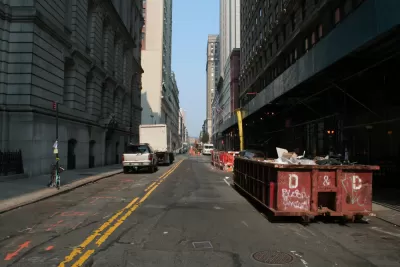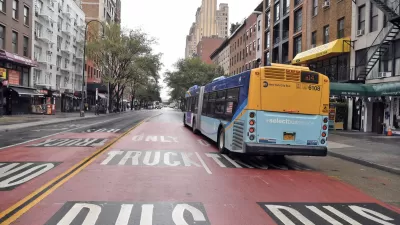The de Blasio Administration has recommended that the city of New York is ready to collect its trash in a new way, with a system known as franchising.

David Giambusso reports that New York City will "begin implementing a 'zoned-collection' system for the city's private carting industry…" According to Giambusso, the change represents "an historic change in how commercial waste is collected and managed in New York City."
In a report that's scheduled to be released Wednesday, the de Blasio administration will argue a zoned-collection system, known elsewhere as 'franchising,' will dramatically reduce vehicle emissions while also giving the city much greater regulatory authority over an industry critics have likened to the wild west.
The New York State Department of Sanitation collects all residential waste in the city, but private contractors collect waste from "virtually all of the waste collected from businesses, both large and small," explains Giambusso. The private trash collectors are heavily criticized by labor and environmental groups, however, leading to the de Blasio Administration's actions.
Zone collection essentially means the city will be divided into zones and contractors will be allowed to bid on specific sectors. Now, a single city block can be serviced by more than a dozen different companies, leading to inefficient routes, excessive pollution and traffic.
The report expects that efficiencies gained from a zoned system will also drive down trash collection prices.
It could take "two years for the city to develop a plan and another three years or more to implement it," reports Giambusso, and "the City Council will have to pass legislation to codify the changes."

Alabama: Trump Terminates Settlements for Black Communities Harmed By Raw Sewage
Trump deemed the landmark civil rights agreement “illegal DEI and environmental justice policy.”

Planetizen Federal Action Tracker
A weekly monitor of how Trump’s orders and actions are impacting planners and planning in America.

The 120 Year Old Tiny Home Villages That Sheltered San Francisco’s Earthquake Refugees
More than a century ago, San Francisco mobilized to house thousands of residents displaced by the 1906 earthquake. Could their strategy offer a model for the present?

In Both Crashes and Crime, Public Transportation is Far Safer than Driving
Contrary to popular assumptions, public transportation has far lower crash and crime rates than automobile travel. For safer communities, improve and encourage transit travel.

Report: Zoning Reforms Should Complement Nashville’s Ambitious Transit Plan
Without reform, restrictive zoning codes will limit the impact of the city’s planned transit expansion and could exclude some of the residents who depend on transit the most.

Judge Orders Release of Frozen IRA, IIJA Funding
The decision is a victory for environmental groups who charged that freezing funds for critical infrastructure and disaster response programs caused “real and irreparable harm” to communities.
Urban Design for Planners 1: Software Tools
This six-course series explores essential urban design concepts using open source software and equips planners with the tools they need to participate fully in the urban design process.
Planning for Universal Design
Learn the tools for implementing Universal Design in planning regulations.
Clanton & Associates, Inc.
Jessamine County Fiscal Court
Institute for Housing and Urban Development Studies (IHS)
City of Grandview
Harvard GSD Executive Education
Toledo-Lucas County Plan Commissions
Salt Lake City
NYU Wagner Graduate School of Public Service





























